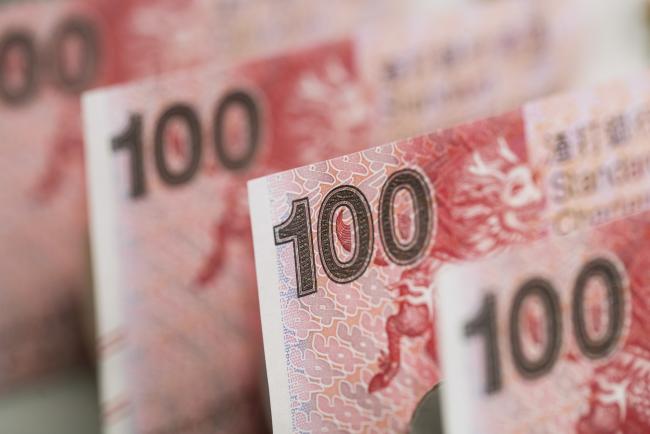(Bloomberg) -- The Hong Kong dollar jumped the most since December on Wednesday, as short-sellers were burned by spiking borrowing costs.
The exchange rate strengthened as much as 0.14 percent, moving away from the weak end of its trading band, where it had been stuck for weeks. It pared the advance to 0.05 percent as of 5:24 p.m. local time. The Hong Kong Monetary Authority has spent $2.8 billion since the start of March to defend the peg.
The currency’s forward points have surged, with the one-month tenor touching the highest level since September, reflecting tighter liquidity and thus higher costs for traders to build bearish wagers. The Hong Kong dollar’s interbank interest rates, known as Hibor, also climbed, with the one-month cost rising the most this year Wednesday.
“Some short carry trade unwinding is reasonable,” said Stephen Chiu, foreign-exchange and rates strategist at China Construction Bank Asia Corp. “This movement could be temporary -- the interbank liquidity situation wasn’t that bad, so the Hong Kong dollar rates should soften again in the future. And we do expect the U.S. rates to rebound.”
A gap between borrowing costs in the city and the U.S. fueled weakness in the Hong Kong dollar in March, as traders sold the local currency and put the proceeds in the higher-yielding greenback. That spread has narrowed, partly thanks to intervention, from almost 1.6 percentage points in February to 43 basis points -- making shorting the Hong Kong currency a less lucrative trade.
Gains in local equities this year could also be contributing to the advance, as investors purchase the city’s currency to chase the rally, according to Ryan Lam, head of research at Shanghai Commercial Bank Ltd. The Hang Seng Index closed at the highest since June on Tuesday, before slipping 0.1 percent Wednesday.
The currency may move back to HK$7.85 per greenback later this month, according to Chiu and Lam.
The Hong Kong dollar’s one-month Hibor jumped 27 basis points to 2.05429 percent, its highest level this year.
After covering their stop-loss positions, investors will likely rebuild their bearish bets, pushing the Hong Kong dollar back to the weak end of the trading band, said Ken Cheung, a senior Asian foreign-exchange strategist at Mizuho Bank Ltd.
